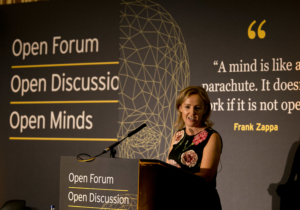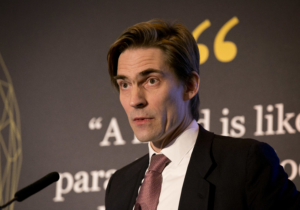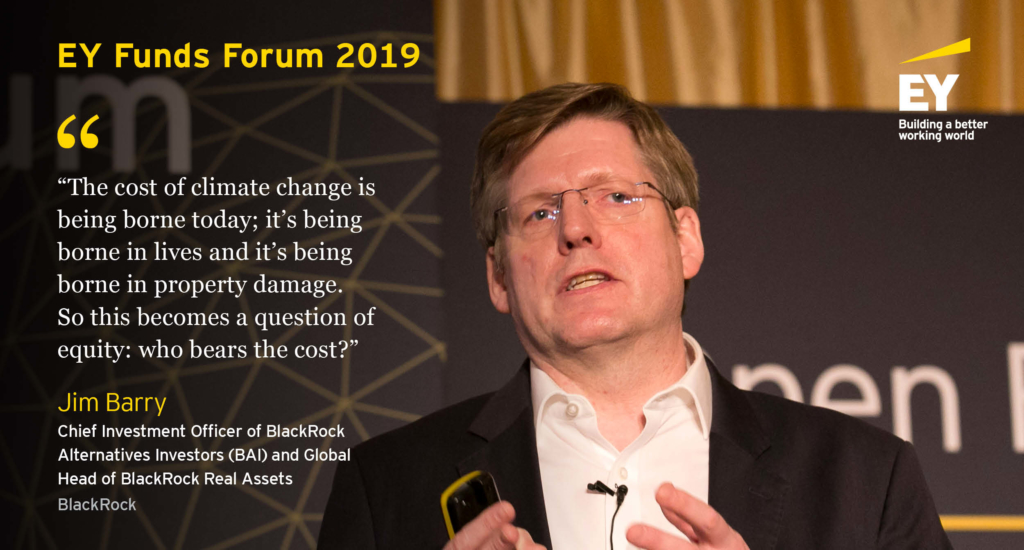
EY’s annual Funds Forum took place on 3 December at the Shelbourne Hotel, bringing together thought leaders and decision-makers to discuss and reflect on the industry’s biggest trends and priorities.
Introducing the event, Lisa Kealy, EY’s Wealth & Asset Management Leader, celebrated the incredible success of the Irish funds industry to date while acknowledging that this success cannot create complacency about the future. She said, “We need to respond to the rapidly changing world in which the funds industry operates, whether it be low or zero interest rates, worries about the liquidity of some funds or the stories and themes we see in the news every day. It’s critical that we have a complete product range, and in that regard the Investment Limited Partnership Bill is an urgent priority. But I also think that the Irish funds industry should think bigger than that; we need to do much more than respond to current changes. In my view we need to do two things: look to the horizon to consider future challenges, and use that perspective to set a more ambitious vision for the future.”
The first speaker to the stage was Michael McGrath, TD & Fianna Fáil Spokesperson on Finance. Michael commended the impact of the funds industry in Ireland, saying “By any yardstick the success of the funds industry in Ireland in recent years has been very impressive. Whether it be measured by employment or tax receipts, the positive economic impact is very real and welcomed.”
Deputy McGrath also provided an update on the long-awaited Investment Limited Partnership Bill, which he expects to be in place by January or February at the latest. He commented, “The amendments to the 1994 Act proposed in the current bill will modernise the operation of ILPs in Ireland…While we’ve had much success in the so-called open-ended fund structures we’ve had less success with the closed-ended space in which this ILP structure fits. That type of structure lends itself more as the vehicle of choice for investment in the real economy because it meets the requirements of long term professional investors in ways that are hard to achieve through the other funds’ structures that we have.“

The European Commission’s Mattias Levin, Deputy Head of Unit, Bank and Financial Conglomerates, DG FISMA (above), outlined the focus for the EC over the next three years, from liquidity risks to revised AIFMDF and MiFID. He also discussed the new prudential framework for investment firms, which seeks to make prudential requirements more proportionate and risk-sensitive for the industry.
Commenting on the need for a truly integrated capital market, he said: “Since the financial crisis we have seen a decrease in financial integration, with very limited cross-border risk-sharing which is what the private capital market would bring. As a result, we see an increase in inequalities between member states which undermines the kind of convergence process that we would like to see in the EU. In that respect, we really do need deep and liquid financial markets for the economic and monetary union to work in a way that diversifies and reduces risk.
That then begs the question – what hinders the creation of an integrated market for capital? To put it shortly – barriers. It’s like peeling away the layers of onion: as you take away one barrier another one arises. Economic barriers, legal barriers, political barriers sometimes, and more profoundly, cultural and societal barriers – for example, the kind of investment culture you see that is present in some member states and less present in others.”

The Central Bank’s Michael Hodson followed with a speech that focused on the evolution of supervision and the CBI’s priorities for 2020. He commented that next year, “the successful implementation of the IFR, from a supervisory perspective, will be a key part of our work in the Asset Management and Investment Banking Directorate.” Click through to read the full text of Michael’s speech.
EY partner Fergus McNally hosted an engaging panel discussion on one-year post authorisation, where Angela Billick, Head of Investment Product – Europe, COO Manulife Investment Management (Ireland) and Victoria Brown, Managing Director, Aberdeen Standard Investments Ireland, shared their different experiences of relocating to Ireland.
Both commented on the strong feeling of community amongst the industry in Ireland, and on the changing nature of that community. Victoria said, “Typically there has been a lot of focus on third-party administrators but there are a number of us here in industry. I think that industry associations need to adapt for the new challenge and the new industry, and look at how we can grow that, be effective and have Ireland considered as front office players going forward.” Angela added: “I think that we have the opportunity to demonstrate that the wealth of Ireland is clearly on the rise…The services that we can provide in asset management, just here locally, will come from the front office and from portfolio management.”

Alternatives and Real Assets in a Challenging World was the topic of Jim Barry’s address. The Chief Investment Officer of BlackRock Alternatives Investors (BAI) and Global Head of BlackRock Real Assets provided an overview of some of the challenging dynamics at play, focusing in particular on: increased competition for assets; Increasingly international capital flows, and building portfolio resilience.
A key focus of his talk was that sustainability is no longer an option. He said: “The cost of climate change is being borne today; it’s being borne in lives and it’s being borne in property damage. So this becomes a question of equity: who bears the cost?”

Sustainability was also a key theme for the next panel discussion, The winds are changing, ably moderated by EY partner Paul Traynor. Looking to the future, Ann Prendergast, Senior Managing Director & Head of State Street Global Advisors Ireland, commented that: “A company’s ESG rating will be as important as its credit rating in the next five years.” Carmel Jordan, European COO, Delegated Solutions, Mercer Investments, said: “With the new EU Commissioner being female, Christine Lagarde taking up her role as President of the ECB and 12 of the 27 new Commissioners being female – so we almost have parity – I hope that in five years’ time we’ll see that diversity and inclusion will certainly have evolved.”
Declan Quilligan, European Head of Hedge Funds, Citco Fund Services, said: “Adaptability and the ability to evolve as we move to the future is very important. It’s a global service delivery model that is operated in the asset management industry today and I don’t think we can lose sight of that.” Meanwhile, the importance of education was highlighted by Paul Price, Global Head of Distribution & CEO, who stressed the important of engaging with the universities in Ireland in order to future-proof the industry. “We should be engaging with the students where we actually try to capture their minds, around something that they can believe in when it comes to what an asset management industry can deliver in the future. Making Ireland a centre for sustainability initiatives globally should be an ambition of all of us in the room, and we should impart that vision and that opportunity and belief on Ireland’s students”, he said.
The event concluded with an overview from Edel O’Malley of basis.point, the Irish funds industry’s initiative to come together to help make a difference to those in need. The initiative has to date made commitments totalling over €1.4million to six Irish charities, which include the Early Learning Initiative at National College of Ireland and the Suas Numeracy Programme – read more about the great work that is being done.